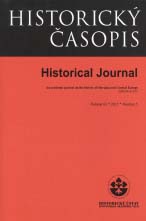Confessionally mixed marriages. Legal norms and social practice in the Kingdom of Hungary up to 1848.
Confessionally mixed marriages. Legal norms and social practice in the Kingdom of Hungary up to 1848.
Author(s): Peter ŠoltésSubject(s): Political history, Social history, Modern Age, Family and social welfare
Published by: SAV - Slovenská akadémia vied - Historický ústav SAV
Keywords: Confessionally mixed marriages; Kingdom of Hungary; Josephinism; Ecclesiastical norms; Social norms; Reverses; Reform period;
Summary/Abstract: The aim of the study is to present the development of ecclesiastical and civil legal norms regulating the conclusion of mixed marriages and the question of the religious allegiance of children in the Kingdom of Hungary. It analyses the interventions of the state authorities and the Catholic Church in the period from the middle of the 18th century to the revolution of 1848. Joseph II’s ecclesiastical policies created a new legal framework in which the interests and aims of the state and the Catholic Church began to diverge. During the Napoleonic Wars and especially in the reform period, mixed marriages became a subject of politicization and struggle between the liberal opposition and the conservative pro-government group supported by the Catholic hierarchy. The study also includes a sounding into the discourse of the time and analyses representative texts of both Catholic and Protestant origin. In the final part, the author considers the social strategies developed in confessionally mixed local communities in reaction to the disciplinary pressure from the authorities.
Journal: Historický časopis
- Issue Year: 63/2015
- Issue No: 5
- Page Range: 813-845
- Page Count: 33
- Language: English

